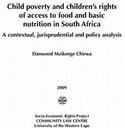
Latest resources


This is the third issue of the ESR Review for 2011. It is a special issue that focuses on and explores the interplay between access to socio-economic rights in the context of persons with disabilities and the needs of persons with disabilities to have economic and social security.

This is the second issue of the ESR Review for 2011. It hails the adoption of the Principles and Guidelines on the Implementation of Economic, Social and Cultural Rights in the African Charter on Human and Peoples’ Rights by the African Commission on Human and Peoples’ Rights during its 48th ordinary session held from 10 to 24 November 2010 in Banjul, The Gambia. This long-awaited instrument is a landmark in the evaluation of economic social and cultural rights in Africa.

The Child Justice Alliance hosted a one-day workshop to sensitize former reform school principals and provincial coordinators on the provisions of sentencing contained within the Child Justice Act. The purpose was to enlighten the CYCC principals on the provisions and to bring them together to provide recommendations on what is needed and how to address there challenges. These recommendations will be presented to the Inter-Sectoral Committee on Child Justice to action.

Prof Ann Skelton and Dr Charmain Badenhorst conducted research on the criminal capacity of children in the South African child justice system. This research is informed by international developments at a United Nations level, together with developments in other countries both on the African continent and elsewhere. The purpose of this research is to add to the debate on the review of the criminal capacity provisions in the Child Justice Act of South Africa, which should take place no later than 2015.


The first issue of 2011 features Realising the rights of older persons in South Africa and an appraisal of General Recommendation 27 of the CEDAW Committee on protecting the rights of older women.

The issue includes articles that provide an overview of the protection and enforcement of socio-economic rights in Africa today.

On 15 September 2010 civil society organisations and human rights institutions participated in a seminar to discuss South Africa’s 2010 Draft Report on the status of its progress towards achieving the United Nations (UN) Millennium Development Goals (MDGs). The seminar took place against the backdrop of the MDG Review Summit that will take place at the United Nations in New York from 20-22 September 2010 as well as the UN’s annual treaty signing event also taking place from 21 to 23 and 27 to 28 September 2010 in New York.

The issue includes articles on adolescents' sexual health rights, regulating private power in health, protection of socio-economic rights by the African Commission. It also contains developments on parliament and the MDGs as well as HIV and AIDS, among others.



A compilation of chapters on local government in Zimbabwe, addressing matters such as institutions, elections, finance, traditional leadership, powers and supervision.









Research Report number 7. This research report is written by Prof Danwood Mzikenge Chirwa. Millions of children in South Africa bear the yoke of extreme forms of poverty and its associated evils, such as malnourishment, stunted growth, nutritional-deficiency diseases and illiteracy. The depreciation of the South African rand towards the end of 2008 and the current global financial crisis have only served to entrench child poverty by pushing poor households into deeper levels of deprivation and relegating those who were previously financially stable to the status of the poor.


Ward committees are posited as the focal point for community participation in municipalities. There are many questions, however, about how effective they are; whether they are useful conduits for community involvement in governance; whether, as ‘created spaces’ for public participation, they are inherently capable of playing that role; and whether they create opportunities for real power-sharing between municipalities and citizens. This research report offers contains in-depth qualitative studies of six ward committees. It provides insight into how ward committees are functioning and the key reasons behind the some of the problems many appear to have. It also provides valuable lessons for strengthening the role of ward committees.

This publication is intended to provide the reader with a simple overview of the contents of the Child Justice Act 75 of 2008 (the Act). It attempts to reduce the ‘legalise’ of the Act; remove constant cross-references to other sections; and bring themes together in a logical and user-friendly manner.
